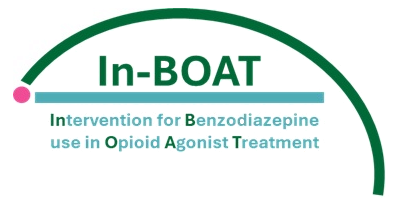In-BOAT
A Randomised Controlled Trial (RCT) of a Diazepam Maintenance Intervention versus Standard Care of Tapering Diazepam to Reduce Dependent Street Benzodiazepine Use in Adults Receiving Opioid Agonist Treatment (OAT) (The In-BOAT Trial)

Funder: NIHR
Trial Protocol: In-BOAT Protocol (NIHR163461)
Chief Investigator: Professor Catriona Matheson
Aim:
To conduct a two-arm RCT with an in-built pilot, to test the clinical effectiveness and cost effectiveness of a tailored diazepam maintenance intervention versus standard care (a tapering dose of diazepam). The RCT will determine which intervention results in greater reductions in use of street benzodiazepines among adults receiving OAT in the UK.
Summary:
Benzodiazepines are medicines prescribed to help anxiety and sleep problems in the short term. However, the use of benzodiazepines with opioid drugs like heroin is common in people who use illegal (street) drugs. This is linked to the high level of drug related deaths (DRD) in the UK. Opioid dependency can be treated safely with opioid agonist treatment (OAT) using methadone or buprenorphine on prescription. However, there is no similar treatment for people who are also dependent on benzodiazepines. This is a problem because street sourced benzodiazepines are being used by people being prescribed OAT. The huge increase in Scottish DRDs is linked to when widespread use of street benzodiazepines began. Street drugs can be stronger than expected or contain a mixture of unknown drugs including new ones. This can cause blackouts, overdose and even death.
The In-BOAT study will include people who are being treated with OAT and who are using street benzodiazepines. The study will test whether providing a steady supply of a prescribed diazepam (a type of benzodiazepine), along with additional support, will reduce the use of street benzodiazepines by participants. Everyone in the study will continue with their OAT treatment.
A successful treatment needs to consider why people use these drugs in the first place. Therefore, the study intervention involves a prescription for diazepam alongside extra support to address why people use benzodiazepines (anxiety, trauma, sleep problems and pain). The intervention also includes safety and harm reduction information to make people aware of the risks of street benzodiazepines and how to keep themselves and other safe.
The above-described intervention, which includes a steady dose of 16-30mg of diazepam, will be compared to 'standard' care. Standard care, recommended by national guidance, involves providing a reducing dose of diazepam over a maximum period of six months. As we do not know if one treatment is better than the other, half of the people who take part in the study will get the steady dose as part of the intervention described above, and half will get the standard care. People will be randomly allocated to the intervention or the standard care group. Participants will take part the In-BOAT study for 12 months.
The trial will cover seven sites across Scotland and England where benzodiazepine use is a particular problem and aims to recruit 230 participants.
CHaRT based at the University of Aberdeen are leading the main trial outcome (contacts below), while the University of Stirling will lead the trials process evaluation. The University of Stirling will also lead on the toxicology surveillance aspect of the trial which seeks to understand and monitor the changes in street benzodiazepines that are available during the In-BOAT trial.
Chief Investigator: Professor Catriona Matheson: catriona.matheson@stir.ac.uk
Centre for Healthcare and Community Research (CHeCR) Collaborators, University of Stirling:
- Dr Karen Berry karen.berry@stir.ac.uk (Process Evaluation Lead)
- Professor Edward Duncan edward.duncan@stir.ac.uk
- Esme Foxworthy-Bowers e.l.foxworthy-bowers2@stir.ac.uk (Toxicology Surveillance)
Co-Investigators:
- University of Aberdeen: Graeme Maclennan, Mary Kilonzo, Graham Scotland
- University of Bristol: Jenny Scott, Mat Hickman
- University of Edinburgh: Michael Eddleston, Roy Robertson
- University of Lancaster: Euan Lawson
- NHS Greater Glasgow and Clyde: Trina Ritchie
- NHS Lanarkshire: Duncan Hill
- NHS Tayside: Seonaid Anderson
- PPI Co-Investigator: Grant Brown
Funder: NIHR
Trial Protocol: In-BOAT Protocol (NIHR163461)
Contacts
In-BOAT study email: inboat@abdn.ac.uk
Trial Manager - Christine Kennedy: christine.kennedy@abdn.ac.uk
Senior Trial Manager - Seonaidh Cotton: s.c.cotton@abdn.ac.uk
